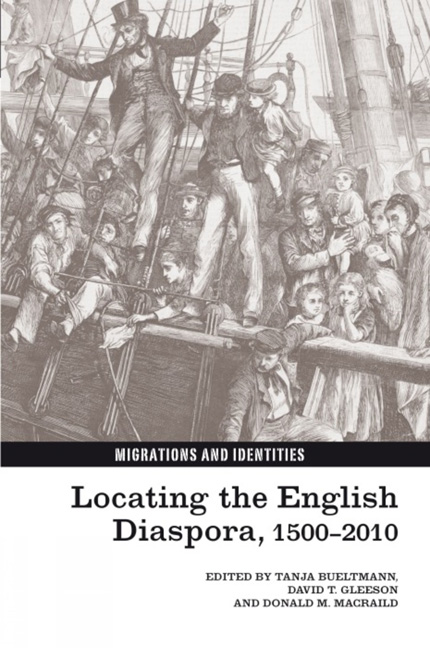Book contents
- Frontmatter
- Contents
- Notes on Contributors
- Introduction. Locating the English Diaspora: Problems, Perspectives and Approaches
- 1 Mythologies of Empire and the Earliest English Diasporas
- 2 The English Seventeenth Century in Colonial America: The Cultural Diaspora of English Republican Ideas
- 3 Fox Hunting and Anglicization in Eighteenth-Century Philadelphia
- 4 The Hidden English Diaspora in Nineteenth-Century America
- 5 An English Institution? The Colonial Church of England in the First Half of the Nineteenth Century
- 6 The Importance of Being English: English Ethnic Culture in Montreal, c.1800–1864
- 7 Anglo-Saxonism and the Racialization of the English Diaspora
- 8 ‘The Englishmen here are much disliked’: Hostility towards English Immigrants in Early Twentieth-Century Toronto
- 9 Cousin Jacks, New Chums and Ten Pound Poms: Locating New Zealand's English Diaspora
- 10 ‘Cooked in true Yorkshire fashion’: Regional Identity and English Associational Life in New Zealand before the First World War
- 11 Englishness and Cricket in South Africa during the Boer War
- 12 An Englishman in New York? Celebrating Shakespeare in America, 1916
- 13 The Disappearance of the English: Why is there no ‘English Diaspora’?
- Index
1 - Mythologies of Empire and the Earliest English Diasporas
- Frontmatter
- Contents
- Notes on Contributors
- Introduction. Locating the English Diaspora: Problems, Perspectives and Approaches
- 1 Mythologies of Empire and the Earliest English Diasporas
- 2 The English Seventeenth Century in Colonial America: The Cultural Diaspora of English Republican Ideas
- 3 Fox Hunting and Anglicization in Eighteenth-Century Philadelphia
- 4 The Hidden English Diaspora in Nineteenth-Century America
- 5 An English Institution? The Colonial Church of England in the First Half of the Nineteenth Century
- 6 The Importance of Being English: English Ethnic Culture in Montreal, c.1800–1864
- 7 Anglo-Saxonism and the Racialization of the English Diaspora
- 8 ‘The Englishmen here are much disliked’: Hostility towards English Immigrants in Early Twentieth-Century Toronto
- 9 Cousin Jacks, New Chums and Ten Pound Poms: Locating New Zealand's English Diaspora
- 10 ‘Cooked in true Yorkshire fashion’: Regional Identity and English Associational Life in New Zealand before the First World War
- 11 Englishness and Cricket in South Africa during the Boer War
- 12 An Englishman in New York? Celebrating Shakespeare in America, 1916
- 13 The Disappearance of the English: Why is there no ‘English Diaspora’?
- Index
Summary
Our modern mythologies of empire and migration need to take into account the mythologies through which the sixteenth- and seventeenth-century English perceived themselves and the world, myths that in succeeding centuries germinated in different forms throughout the English Diaspora. To understand early modern thinking we must surrender some of our modern preconceptions. We have abandoned charismatic prophecy as a method of political explanation. Sharing the Enlightenment belief in applying a scientific approach even to the mysteries of human emotion, we prefer opinion polls.
However, this chapter engages with a pre-Enlightenment society and political culture in which only the opinions of the powerful few mattered, a culture that possessed few political mechanisms for peacefully transforming the body politic. To the powerful, expectations of a different future could be defined in one word – treason. In such a society one of the few semi-legitimate pressure valves for expressing the hopes and desires of the mass of English people was a belief in prophecies of abrupt political change, either to recover a lost golden age or to perfect human society in preparation for the apocalypse. This chapter discusses some ways in which a prophetic sense of the future informed early ideas of empire and migration, because they were inextricably linked to the question of what it meant to be English in the sixteenth century.
- Type
- Chapter
- Information
- Locating the English Diaspora, 1500–2010 , pp. 15 - 33Publisher: Liverpool University PressPrint publication year: 2012



